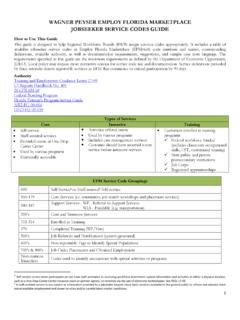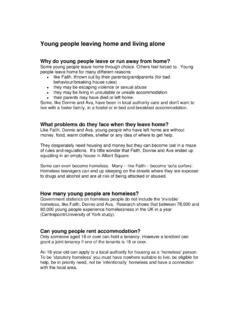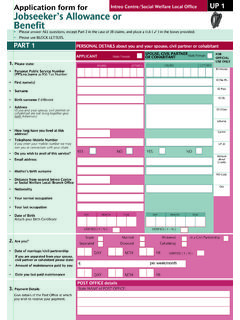Transcription of Jobseeker's Allowance: back to work schemes
1 1 When you claim jobseeker s Allowance because you are unemployed and expected to look, or prepare for work, there are a range of schemes available to develop your skills and experience to help you find work. During your time on jobseeker s Allowance, your work coach may refer you to these schemes . For example if your English or Maths needs improving, or if getting a recognised qualification would help. Or you may do work experience to add some career history to your CV. Your work coach can tell you if the schemes mentioned in this guide are suitable for you. This guide gives information about the different schemes , including what we expect you to do when you are on one.
2 You should tell your work coach if you have any concerns about what a scheme involves or what is required of you. Your work coach will want you to ask questions so you are able to benefit from being on a scheme. Remember the reason we have these schemes is to help with a return back into work. Some of the schemes are delivered for Jobcentre Plus by other organisations, which we call providers . If you feel one of the schemes would help you, then please discuss it with your work coach. Make sure you ask about other local support available through your Jobcentre too. Please speak to your work coach if you need help understanding this guide, or have any other questions.
3 Please note: This guide is intended for people on Jobseekers Allowance. You may be able to do some of these schemes if you claim other benefits (such as Employment and Support Allowance or Income Support). If you are interested in one of these schemes , you should speak to your work coach about whether you can do it and how it may affect your benefit. Back to Work schemes Jobseeker's Allowance JSABWS1 | (April 2018) BWS1 | v0a. (April 2018) 2 Contents Skills go to page 3 We assess what skills you need to start work.
4 If lacking certain skills is the main thing stopping you getting a job, we will refer you to a skills assessment or training. If it is not clear what skills you need to help you find work you ll be referred for an in-depth skills assessment with the National Careers Service in England, My World of Work in Scotland or Careers Wales. Sector-based work academy go to page 5 You may be able to attend a sector-based work academy if you live in England or Scotland. It will help you to develop the skills and behaviours employers are looking for in new employees. A sector-based work academy offers training and work experience in a particular job type.
5 At the end, you'll either get a job interview or help with the employer's application process. Traineeship go to page 7 A traineeship is an education and training programme with work experience that unlocks the great potential of young people and prepares them for their future careers by helping them to become work ready . Designed to help young people aged 16 to 24 who don t yet have the appropriate skills or experience, traineeships provide the essential work preparation training, English, maths and work experience needed to secure an apprenticeship or employment Work experience go to page 9 You may be able to volunteer to do a work experience opportunity.
6 Work experience usually lasts for 2 to 8 weeks, and you'll normally be expected to do 25 to 30 hours a week. We call employers who offer work experience opportunities host employers and it is referred to as work experience . New Enterprise Allowance go to page 11 This scheme helps people to start their own business, and offers business mentoring and financial support if you want to become self-employed. You ll need to have your business idea assessed by a mentoring provider, and if you are accepted onto the scheme, you ll then have support to produce your business plan. You may also be able to apply for the weekly New Enterprise Allowance financial support.
7 Benefit sanctions go to page 15 A benefit sanction is when your money is stopped or reduced for a certain period. Sanctions usually happen if you haven't met the conditions for getting benefit, including refusing to take part or complete certain activities or schemes . BWS1 | v0a. (April 2018) 3 Training or other help to gain new skills If you don t have the type of skills employers are looking for, you may be offered the support needed to improve your skills, including having your skills assessed, and/or attending training to help you get the skills needed to move into, and stay in work. Your Work Coach may ask you to take action to improve your skills.
8 You may be asked to: Meet with a careers adviser to discuss your skills and job aims Meet with a training provider ( at a college) to discuss training Complete a training course. This may be agreed as part of your claimant commitment. If so, you must complete this activity or your benefits may be reduced or stopped. This is called a benefit sanction. A careers adviser will help you consider the type of jobs you might like to do, the skills you have and how training may improve your chances of finding work or a better-paid job. A training provider will look to assess: Your English, maths, and Information & Computer Technology (ICT) skills Your spoken language skills, if English is not your first language Any job-specific skills or qualifications you already have Other work skills from previous jobs or work experience.
9 How long does it last for? How much time you spend in training will depend on the type of course and the help you need to improve your skills. Training for specific jobs such as customer service training typically lasts one to two weeks. Training to improve your English, maths or computer skills will usually be longer. Your work coach will explain what the course involves and when you need to attend. When can I take part? When you attend your 1st work coach interview, they will discuss with you if assessing your skills and starting appropriate training is suitable for you. Do I have to attend?
10 If you are receiving Jobseekers Allowance because you are unemployed, you must attend and complete any activity agreed with your Work Coach and recorded on your Claimant Commitment. If you are claiming Employment Support Allowance or Income Support because you have a health condition or caring responsibilities, your work coach will tell you what you are required to do. If you fail to attend an interview with a careers adviser, complete the skills assessment or attend the training course as agreed by your Work Coach, without good reason, your benefit could be reduced or stopped. This is called a benefit sanction.
















